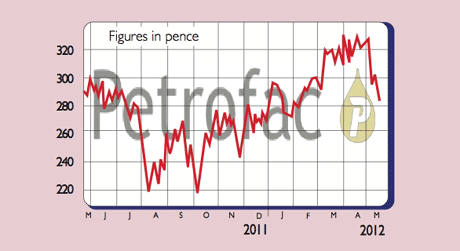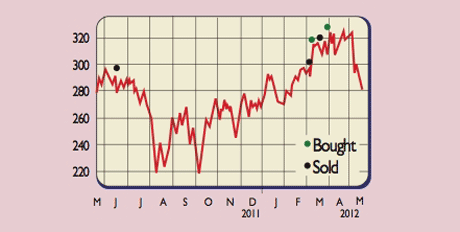Should you buy this niche oil industry player?
Oilfield services company Petrofac aims to double its profits in the next three years. Will it succeed? And should you buy in? Phil Oakley investigates.
Get the latest financial news, insights and expert analysis from our award-winning MoneyWeek team, to help you understand what really matters when it comes to your finances.
You are now subscribed
Your newsletter sign-up was successful
Want to add more newsletters?

Twice daily
MoneyWeek
Get the latest financial news, insights and expert analysis from our award-winning MoneyWeek team, to help you understand what really matters when it comes to your finances.

Four times a week
Look After My Bills
Sign up to our free money-saving newsletter, filled with the latest news and expert advice to help you find the best tips and deals for managing your bills. Start saving today!
Petrofac aims to double its profits in the next three years. Phil Oakley considers whether you should buy in.
The business
Petrofac is an oilfield services company with access to many profitable niches. Its key business is designing and building oil and gas facilities for exploration companies. Most of this work is for onshore facilities in the Middle East and former Soviet states. It also has significant offshore interests in locations such as the North Sea.
Once built, it typically operates and maintains a facility for the end customer. It also helps customers develop new oil and gas fields and increase the productivity of their existing fields. On top of these services, Petrofac offers employee training, engineering and consultancy to the oil and gas industry. In 2011 the firm had sales of $5.8bn and an outstanding order book of $10.8bn.
MoneyWeek
Subscribe to MoneyWeek today and get your first six magazine issues absolutely FREE

Sign up to Money Morning
Don't miss the latest investment and personal finances news, market analysis, plus money-saving tips with our free twice-daily newsletter
Don't miss the latest investment and personal finances news, market analysis, plus money-saving tips with our free twice-daily newsletter
The history
Petrofac began life in 1981 in Texas with just 25 employees. It began expanding overseas in 1991 when Ayman Asfari and Maroun Semaan joined the business to form Petrofac International. The business started winning small construction contracts but quickly began to run out of money.
Its fortunes turned when, with the help of a partner, it won a big contract in Oman. Further success followed and Petrofac established its own oil and gas business. In 2002, the company raised more money, with British venture capitalists 3i taking a 13% stake in the business. Petrofac then broadened its offering by buying maintenance and training companies.
In 2005, it floated on the London Stock Exchange. Since then it has experienced rapid growth in sales and profits. Its oil and gas assets were divested in 2010, to create a focused oil services company.
The chief executive
Ayman Asfari has been CEO since 2002 having joined Petrofac in 1991. Initially from Syria, Asfari ran a successful construction business in Oman during the 1980s. After working on some projects with Petrofac, he was then asked to run their non-American business and was given an equity stake in the firm.
The success of Petrofac has made him a wealthy man. He uses some of his wealth to fund his own charitable foundation helping to support the education of bright people from the Middle East. Along with his family, he is the largest shareholder in Petrofac. He was paid $2.5m in 2011.
Should you buy the shares?
Petrofac is aiming to double its 2010 profits by 2015. It looks to be well placed to do that. High oil prices means that spending on oil and gas projects by Petrofac's customers is expected to grow. The fact that oil and gas is becoming more difficult to find also suits its skillset.
Petrofac also has scope to diversify its business into petrochemical plants and liquefied natural gas (LNG) facilities as well as establishing itself in new countries. More profits are expected to come from projects where Petrofac's profits are linked to the production of oil and gas. This in turn could expand profit margins significantly.
Despite the strength of its markets, it is important to remember that most of Petrofac's profits still come from construction projects. Success here depends on a tight management of costs and an ability to keep winning new orders. After taking into account that almost half its cash pile comes from customers paying in advance, Petrofac still has very strong finances and makes good returns on its capital.
However, for an investor, trying to work out what its sustainable profits are is quite tricky. Petrofac is a well-managed company offering a diverse spread of oil and gas related assets and expertise. That said, its shares trading on just under 13 times forecast earnings look high enough for now.
The numbers

Stockmarket code: PFC
Share price: 1,490p
Market cap: £5.1bn
Net assets (Dec 2011): $1.1bn
Net cash (Dec 2011): $1.5bn
P/e (current year estimate): 12.6 times Yield (prospective): 2.7%
What the analysts say
Buy: 14
Hold: 7
Sell: 2
Average price target: 1,938p
Directors' shareholdings

A Asfari: 62,900,835
M Semaan: 28,217,864
N Murray: 9,630
This article was originally published in MoneyWeek magazine issue number 590 on 25 May 2012, and was available exclusively to magazine subscribers. To read all our subscriber-only articles right away, subscribe to MoneyWeek magazine.
Get the latest financial news, insights and expert analysis from our award-winning MoneyWeek team, to help you understand what really matters when it comes to your finances.
Phil spent 13 years as an investment analyst for both stockbroking and fund management companies.
-
 Should you buy an active ETF?
Should you buy an active ETF?ETFs are often mischaracterised as passive products, but they can be a convenient way to add active management to your portfolio
-
 Power up your pension before 5 April – easy ways to save before the tax year end
Power up your pension before 5 April – easy ways to save before the tax year endWith the end of the tax year looming, pension savers currently have a window to review and maximise what’s going into their retirement funds – we look at how